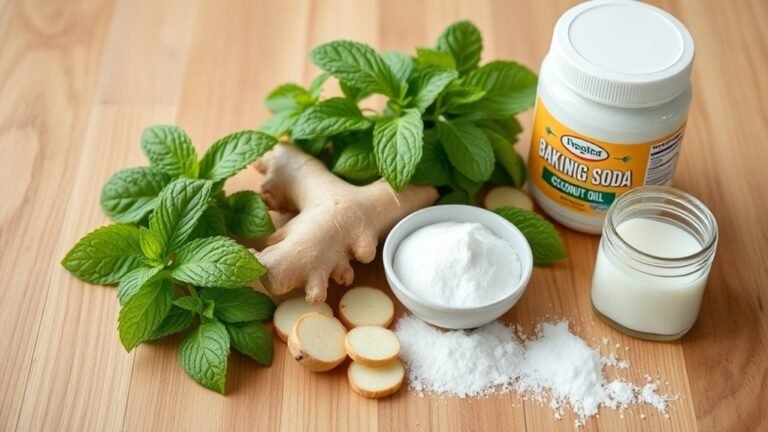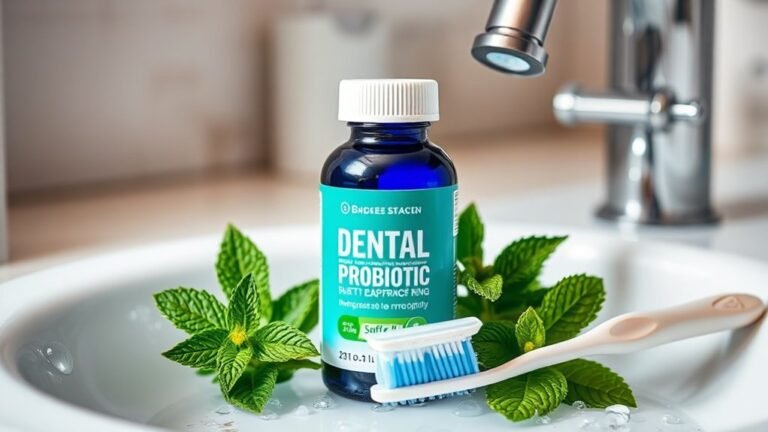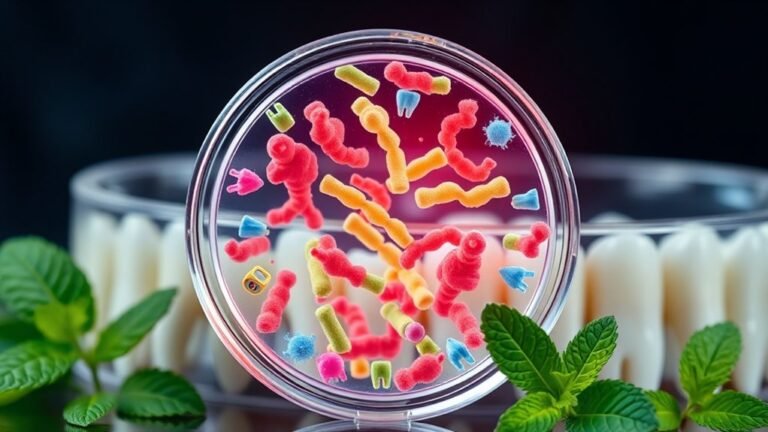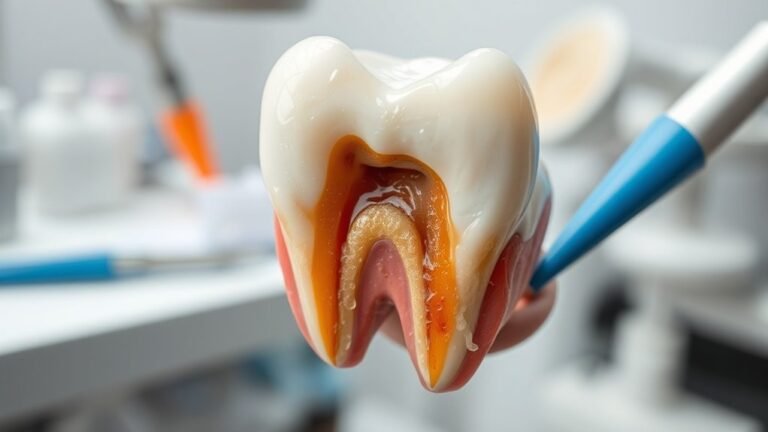Proper Hydration Improves Oral Health and Reduces Gum Irritation Naturally
Proper hydration plays an essential role in maintaining your oral health and naturally reducing gum irritation. By increasing saliva production, hydration helps wash away food particles, neutralize acids, and protect against plaque buildup. Dehydration, on the other hand, can lead to dry mouth, heightened gum sensitivity, and increased risk of inflammation. Staying hydrated not only promotes healthier gums but also boosts your overall wellbeing. Discover more strategies to enhance your oral health with simple lifestyle adjustments.
Key Takeaways
- Proper hydration boosts saliva production, which protects against tooth decay and promotes healthy gums by washing away food particles and neutralizing acids.
- Staying hydrated prevents dry mouth, reducing bacterial growth and discomfort, while also lowering the risk of gum inflammation and gingivitis.
- Increased saliva flow enhances oral hygiene by acting as a natural cleanser, supporting tissue healing, and minimizing plaque buildup and gum irritation.
- Drinking enough water helps maintain a balanced oral microbiome, reduces bad breath, and flushes out toxins that can harm gum health.
- Incorporating hydrating foods like cucumbers and oranges further supports hydration, nutrition, and overall oral health.
The Importance of Hydration for Oral Health
Hydration plays an essential role in maintaining ideal oral health. When you stay properly hydrated, saliva production increases, which is critical for washing away food particles and neutralizing acids in your mouth. This natural process helps to prevent tooth decay and reduces the risk of cavities. Additionally, adequate hydration supports gum health by keeping tissues moist and promoting healing. If you’re not drinking enough water, you may experience dry mouth, leading to discomfort and increased bacteria growth. To optimize your oral health, make it a habit to drink plenty of water throughout the day. Remember, good hydration isn’t just beneficial for your body; it’s fundamental for your oral health, too. Prioritize your hydration to maintain a healthy smile.
How Dehydration Affects Your Gums
Dehydration can greatly impact your gums, leading to various oral health issues. When you’re not adequately hydrated, the risk of gum inflammation increases, making your gums more susceptible to conditions like gingivitis. Here are some ways dehydration affects your gums:
- Dry Mouth: A lack of saliva can lead to a dry mouth, promoting bacterial growth.
- Gum Sensitivity: Dehydration can heighten sensitivity, causing discomfort during eating or brushing.
- Increased Plaque Buildup: Reduced saliva flow makes it easier for plaque to accumulate, leading to inflammation.
- Delayed Healing: Dehydration slows down the healing process of gum tissues, prolonging irritation.
The Role of Saliva in Oral Hygiene
While many people may not realize it, saliva plays an essential role in maintaining oral hygiene and overall health. It acts as your mouth’s natural cleanser, helping to wash away food particles and neutralize acids produced by bacteria. This process is vital in preventing tooth decay and gum irritation. Saliva also contains important enzymes and proteins that aid in digestion and support the healing of oral tissues. When you’re properly hydrated, your saliva production increases, enhancing these protective functions. Conversely, dehydration can lead to dry mouth, reducing saliva flow and heightening the risk of dental issues. By staying hydrated, you promote ideal saliva levels, which helps maintain healthy gums and minimizes gum irritation, ensuring a healthier mouth overall.
Common Signs of Gum Irritation
When it comes to gum health, you should be aware of several common signs of irritation. Look out for swelling and redness, bleeding during brushing, and persistent bad breath, as these can indicate underlying issues. Recognizing these symptoms early can help you take proactive steps to maintain your oral health.
Swelling and Redness
Gum irritation often manifests through noticeable swelling and redness, signaling that your oral health may need attention. These symptoms can indicate underlying issues, such as:
- Plaque buildup: Excess plaque can lead to gum swelling and inflammation.
- Poor oral hygiene: Inconsistent brushing and flossing may exacerbate gingival bleeding and irritation.
- Nutritional deficiencies: Lack of essential vitamins, particularly vitamin C, can contribute to gum health problems.
- Dehydration: Insufficient hydration can cause dry mouth, leading to increased gum swelling and irritation.
Addressing these factors can help alleviate symptoms and promote healthier gums. Remember, if you notice persistent swelling and redness, it’s vital to consult a dental professional for a thorough evaluation and tailored advice.
Bleeding During Brushing
Noticing blood on your toothbrush after brushing can be a concerning sign that your gums are irritated. This bleeding, often referred to as bleeding gums, is a common symptom of gum sensitivity and can indicate underlying issues such as gingivitis or periodontal disease. When your gums are inflamed, they become less resilient, making them more susceptible to damage during brushing. To address this, make certain you’re using a soft-bristled toothbrush and gentle brushing techniques. Additionally, maintaining proper hydration is crucial, as it helps keep your oral tissues healthy and reduces irritation. If the bleeding persists, it’s important to consult a dental professional for a thorough evaluation and tailored recommendations to improve your gum health and overall oral hygiene.
Persistent Bad Breath
If you’re experiencing persistent bad breath, it may be more than just a temporary issue; it could be a sign of gum irritation or an underlying dental problem. This unpleasant symptom often indicates an imbalance in your oral microbiome or gum disease symptoms. To address this issue effectively, consider the following:
- Improve hydration: Drinking enough water helps maintain saliva production, which is essential for neutralizing odors.
- Maintain oral hygiene: Regular brushing and flossing can remove food particles and plaque that contribute to bad breath.
- Visit your dentist: Professional cleanings can help identify gum disease and other dental issues.
- Watch your diet: Certain foods can exacerbate bad breath; opt for fresh fruits and veggies instead.
Taking these steps can meaningfully improve your oral health and reduce persistent bad breath.
Benefits of Staying Hydrated
Staying hydrated plays an essential role in maintaining your oral health. It enhances saliva production, which helps wash away food particles and neutralize acids, reducing the risk of cavities. Additionally, proper hydration flushes toxins from your body and can greatly diminish bad breath, promoting a fresher mouth overall.
Enhanced Saliva Production
When you maintain proper hydration, your body naturally boosts saliva production, which plays an essential role in oral health. Enhanced saliva production benefits you in several ways:
- Neutralizes Acids: Saliva helps neutralize acids produced by bacteria in your mouth, protecting your tooth enamel.
- Moisturizes Gum Tissue: Adequate saliva keeps your gum tissue hydrated, reducing irritation and promoting overall gum health.
- Aids Digestion: Saliva contains enzymes that begin the digestive process, making it easier for your body to absorb nutrients.
- Cleanses the Mouth: Increased saliva flow helps wash away food particles and bacteria, reducing the risk of cavities and gum disease.
Flushes Toxins Effectively
Proper hydration plays a significant role in flushing out toxins from your body, ensuring that harmful substances are efficiently removed. When you’re well-hydrated, your kidneys function effectively, aiding in detoxification processes that benefit your overall health, including your oral health. This cleansing effect can support gum healing, as it helps maintain a balanced environment in your mouth. Additionally, proper hydration facilitates the absorption of oral probiotics, which can enhance your oral microbiome. A balanced microbiome contributes to healthier gums and reduces inflammation, promoting better oral hygiene. By drinking enough water daily, you’re not only ensuring your body is detoxified but also fostering an environment conducive to gum healing and general oral well-being.
Reduces Bad Breath
Maintaining adequate hydration is essential for combating bad breath, as dry mouth can lead to an increase in odor-causing bacteria. By drinking enough water, you not only keep your mouth moist but also support your overall dental hygiene. Here’s how proper hydration helps reduce bad breath:
- Promotes Saliva Production: Saliva helps wash away food particles and bacteria.
- Reduces Gum Infection Risk: Staying hydrated supports healthy gums, minimizing the chances of infections.
- Flushes Out Odors: Water helps eliminate lingering smells in your mouth.
- Enhances Taste Sensation: A well-hydrated mouth can improve your sense of taste, making you less likely to consume odor-producing foods.
Recommended Daily Water Intake
The average adult should aim for about 8 to 10 cups of water daily to stay properly hydrated. Adequate hydration is essential not just for overall health but also for maintaining healthy gingiva. When you drink enough water, you help your body produce saliva, which plays a vital role in washing away food particles and bacteria. This natural process minimizes plaque buildup, reducing the risk of gum irritation and periodontal disease. Remember, individual needs may vary based on factors like activity level, climate, and diet. Pay attention to your body’s signals, like thirst and urine color, to gauge your hydration status. By prioritizing your water intake, you can support your oral health and keep your gums in top shape.
Tips for Increasing Your Fluid Intake
Staying hydrated can sometimes be a challenge, especially with busy schedules and lifestyle demands. However, increasing your fluid intake is essential for proper hydration and can help alleviate gum pain. Here are four effective tips to boost your hydration:
- Carry a Water Bottle: Keep a reusable water bottle with you to sip throughout the day, making it easier to track your intake.
- Set Reminders: Use your phone or an app to set reminders to drink water regularly.
- Infuse Your Water: Add fruits or herbs to your water for flavor, making it more enjoyable to drink.
- Drink Before Meals: Make it a habit to drink a glass of water before each meal to stay hydrated and potentially reduce gum irritation.
Hydrating Foods to Include in Your Diet
While drinking plenty of water is essential for hydration, incorporating hydrating foods into your diet can greatly enhance your overall fluid intake. Foods like cucumbers, tomatoes, and watermelon are excellent hydrating options, as they contain high water content. Leafy greens, such as spinach and lettuce, also contribute to your hydration needs while providing essential nutrients. Additionally, fruits like oranges and strawberries not only hydrate but also offer antioxidants that support oral health. By including these hydrating foods in a balanced diet, you guarantee you’re getting the hydration your body requires, which can help reduce gum irritation and improve your overall well-being. Aim to make these delicious options a regular part of your meals for peak hydration.
Other Lifestyle Factors That Affect Oral Health
Although many people focus on brushing and flossing, various lifestyle factors greatly influence oral health. Your daily habits can considerably enhance immune support and reduce the risk of dental issues. Consider these key factors:
- Diet: A balanced diet rich in vitamins and minerals strengthens teeth and gums, promoting better oral health.
- Smoking: Avoiding tobacco products can greatly reduce your risk of gum disease and oral cancer.
- Hydration: Staying well-hydrated helps maintain saliva production, essential for neutralizing acids and cleaning the mouth.
- Stress Management: High stress can lead to teeth grinding and poor oral hygiene; finding effective stress relief can benefit your overall dental health.
Frequently Asked Questions
Can Certain Beverages Dehydrate My Mouth More Than Water?
Yes, certain beverages like coffee, alcohol, and sugary drinks can dehydrate your mouth more than water. They may increase thirst and reduce saliva production, leading to discomfort. Opt for water to stay properly hydrated.
How Does Hydration Affect Bad Breath?
Hydration greatly affects bad breath, doesn’t it? When you’re well-hydrated, saliva production increases, flushing away odor-causing bacteria. Conversely, dehydration leads to dry mouth, allowing bacteria to thrive, ultimately worsening your breath. Stay hydrated for freshness!
Is It Possible to Overhydrate?
Yes, it’s possible to overhydrate. Consuming excessive amounts of water can lead to an electrolyte imbalance, resulting in symptoms like nausea, headache, or confusion. It’s essential to drink according to your body’s needs.
Are There Specific Foods That Irritate Gums More When Dehydrated?
Yes, acidic foods like citrus fruits, spicy items, and crunchy snacks can irritate your gums more when you’re dehydrated. Staying hydrated helps mitigate discomfort and supports your overall oral health, so drink plenty of water.
How Does Hydration Influence Overall Dental Health Beyond Gums?
Hydration’s vital for overall dental health. It aids saliva production, which protects against cavities, neutralizes acids, and supports tissue repair. Staying hydrated helps maintain a balanced oral environment, preventing issues like tooth decay and bad breath.
Conclusion
Just as a well-watered garden flourishes, your oral health thrives with proper hydration. By drinking enough water, you nourish your gums and help prevent irritation. Think of saliva as the sunlight that promotes a healthy environment for your teeth and gums. By committing to adequate fluid intake, you’re not just quenching your thirst; you’re cultivating a vibrant smile. Remember, every sip counts towards a healthier mouth and a happier you. Make hydration your daily ritual for lasting oral wellness.






